

Belastingsamenwerking West-Brabant had opnieuw datalek. Directeur Peter Stoffelen spreekt van een wake-upcall om in het vervolg beter naar de beveiliging te kijken.
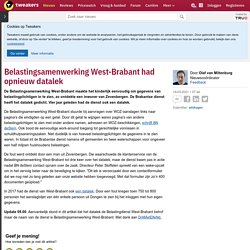
"Dit lek is veroorzaakt door een contactformulier dat we nog niet zo lang geleden aan onze website hebben toegevoegd. Met dat formulier zijn zo’n 400 documenten geüpload. " Ik ben bang dat het voorlopig niet goed gaat komen. Hardware Info. Hardware Info maakt gebruik van cookies Hardware Info is onderdeel van DPG Media.

Onze sites en apps gebruiken cookies, JavaScript en vergelijkbare technologie onder andere om je een optimale gebruikerservaring te bieden. Ook kunnen we hierdoor het gedrag van bezoekers vastleggen en analyseren, en deze informatie toevoegen aan bezoekersprofielen. Google is weighing an anti-tracking feature for Android, following Apple’s lead. Google is considering developing an Android alternative to Apple’s upcoming App Tracking Transparency, a new planned opt-in requirement the iPhone maker will impose on developers that demands they ask for permission to track iOS users across apps and websites.
The news, first reported on Thursday by Bloomberg, underscores the increasing pressure on large tech companies, many spurred on by Apple, to take more proactive measures to better protect user privacy. Google won’t say whether it is indeed working on an anti-tracking privacy measure for Android. But in a statement, a Google spokesperson tells The Verge, “We’re always looking for ways to work with developers to raise the bar on privacy while enabling a healthy, ad-supported app ecosystem.” Judge approves $650 million Facebook privacy settlement over facial recognition feature. WhatsApp is using Status messages—its version of Stories— to try to reassure users about privacy. Amnesty International calls for a ban on facial recognition in New York City. Amnesty International has launched a new campaign against facial recognition titled Ban The Scan — and is launching with a demand for New York City to halt police and government use of the technology.
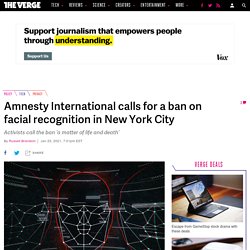
Amnesty argues facial recognition is incompatible with basic privacy rights, and will exacerbate structural racism in policing tactics. “New Yorkers should be able to go out about their daily lives without being tracked by facial recognition,” said Matt Mahmoudi, an AI and human rights researcher with Amnesty. “Other major cities across the US have already banned facial recognition, and New York must do the same.”
Moscow’s facial recognition system can be hijacked for just $200, report shows. A digital rights activist in Moscow was able to purchase access to the city’s extensive facial recognition system for just 16,000 rubles (approximately $200), as reported by the Thomson Reuters Foundation.
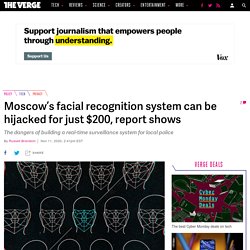
After seeing ads for the service on Telegram, Anna Kuznetsova transferred the money along with a picture of herself to a seller. Two days later, she received an extensive report of her movements over the previous month, apparently pulled directly from the police system. Spanning more than 100,000 cameras across the city, Moscow’s facial recognition system is meant to be restricted to law enforcement. It’s unclear how the seller was able to secure access, whether through bribery or a digital intrusion. Two officers were placed under investigation in the wake of the incident, but Kuznetsova has filed a lawsuit aimed at pausing the program until clearer procedures are set. California poised to establish a new data privacy regulator with Prop 24 win. California’s already tough privacy law is about to get a lot stronger as voters are expected to approve a ballot initiative expanding much of what the law covers this week.
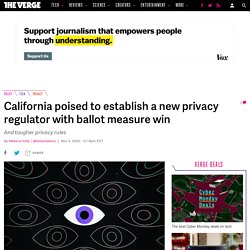
If approved, Proposition 24 would expand California’s privacy law to cover more sensitive data sets and establish a new state agency in charge of enforcing these rules for consumers. The result will be a higher standard for privacy in California and a powerful new state agency to take on tech companies. As of press time, Proposition 24 is leading with 56 percent of the vote, as reported by The Sacramento Bee.
Only about 65 percent of the vote has been tallied, but poll watchers expect the measure to clear based on the early returns. The lead is strong enough that proponents of the bill are already declaring victory. The measure builds on the California Consumer Privacy Act, or CCPA, which passed in 2018 and remains one of the toughest data privacy laws in the country. Facebook appealing order by Ireland’s privacy regulator that could halt EU-US data transfers. Facebook is appealing a preliminary order from the Irish Data Protection Commission (IDPC) that the social media company says would require it to stop data transfers between the US and the European Union, Bloomberg reported.
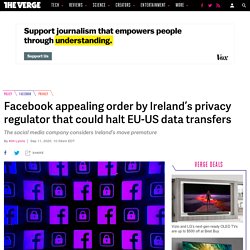
“A lack of safe, secure and legal international data transfers would have damaging consequences for the European economy,” Facebook said in a statement to The Verge on Friday. “We urge regulators to adopt a pragmatic and proportionate approach until a sustainable long-term solution can be reached.” Portland passes strongest facial recognition ban in the US.
The Portland City Council has passed the toughest facial recognition ban in the US, blocking both public and private use of the technology.
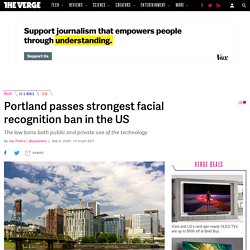
Other cities such as Boston, San Francisco, and Oakland have passed laws barring public institutions from using facial recognition, but Portland is the first to prohibit private use. The ban passed unanimously, according to CNET, CNN, and OneZero. The new law is actually established as two ordinances. The one prohibiting public use of facial recognition (PDF here) is now in effect, and city bureaus must complete an assessment of their facial recognition usage within 90 days. The ordinance prohibiting private use (PDF here) takes effect on January 1st, 2021. Bekende YouTube-downloader gaat offline na auteursrechtenclaim. De DVD die je in de winkel koopt geeft je geen eigendom over de inhoud, je hebt alleen een licentie om de inhoud te bekijken.
